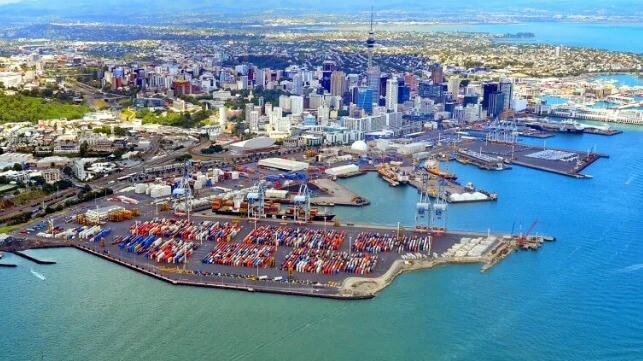Privatization and Relocation of Auckland Port Rejected by Union

The Port of Auckland, New Zealand is facing a new set of challenges as it recovers from four years of operational difficulties. The Maritime Union of New Zealand’s local for Auckland is speaking out against a plan proposed by the City’s mayor to move the port and explore the privatization of its operations.
Elected in October 2022, businessman Wayne Brown ran on a platform that included calling for the redevelopment of Auckland’s waterfront. Immediately after this election, he sent a letter to the chairperson of Ports of Auckland, the port’s operating company, saying that he would call on the Auckland Council to “act more decisively to turn around the port.” In pursuing his position Brown said, “There is no one who voted for me who should have been unaware of my view that car importation and container services should cease at the current site.”
Brown announced at the end of March 2023 that his office is funding a review of Ports of Auckland by a private consulting firm. The mayor briefed the city council and the management of Ports of Auckland on his initiative saying that the review would be focusing on land use plans and exploring the possible sale or “mixed ownership” of the operation. Three elements are being explored including asking if the port could carry out its existing operations on a smaller footprint, seeking interest from investors or port operators for a possible role in the future of the port activity, and how the existing waterfront land could be redeveloped for the benefit of Auckland and its residents.
The Auckland Council looks to use the information from the report as it begins to formulate an updated 10-year plan. Work on the plan is due to start later in 2023 and be finalized by mid-2024.
The Maritime Union local issued a statement rejecting the idea of privatization and saying “There is no need to mess with success.” Maritime Union Branch Secretary Russell Mayn said the confusion around the relocation of the port and now privatization is going to cause more problems for New Zealand’s supply chain security.
“We have seen a major turnaround in performance at Ports of Auckland recently, and we risk undermining this good work,” said Mayn. The union in earlier public statements had also said, “Our view is the Ports of Auckland is now on an extremely promising trajectory …. We need to let the Ports do its job.”
The union points out that the port is not a normal business and by its very nature is a monopoly. The port of Auckland is owned by the city. By world standards, the union admits that it is a small port, but critics point to reports which have consistently cited Auckland as the least efficient port in the region. The World Bank Container Port Performance index ranked Auckland the lowest of 18 ports in Oceania in 2021 while a supply chain analysis by a consulting firm recently said New Zealand companies lose NZ$1.7 billion (US$1 billion) annually to shipping delays.
Previous government studies forecast that the port’s container terminal would run out of capacity by 2055. Brown in 2019 led a government commission that proposed moving the container and car import business approximately 90 miles to the north, a two-hour driving distance from Auckland, to Marsden Point. The idea was rejected by government officials at the time in part due to the distance.
Brown, however, continues to push for the redevelopment of the existing port into a multi-use space with recreational areas as well as housing. He has called for the ro-ro port for cars to leave Auckland by the end of 2024 and container operations to be gone by 2040. He would maintain a small portion of the existing port for cruise ships, ferries, and coastal vessels.
Port officials for their part admit they are emerging from a troubled period saying that a solid turnaround is underway both operationally and financially. Ports of Auckland Chief Executive Roger Gray told The New Zealand Herald that they were rebuilding trust and respect. Among the steps, they highlight increasing the number of stevedores and crane operators after prior management reduced staff at the beginning of the pandemic. The head office staff has also been trimmed and a new partnership was formed with the union to set aside the combative approach of the past. Among the steps they took was moving stevedores to a 40-hour salary instead of hourly wages.
“When there is a pragmatic management that works with the workforce and focuses on getting the basics right, we get a successful port,” says union executive Mayn. The union also points to Ports of Auckland’s decision to abandon a controversial and unsuccessful automation program. One of the concessions the port has made is an effort to retrofit driver cabs to a fleet of automated straddle cranes bought as part of the canceled effort to automate.

that matters most
Get the latest maritime news delivered to your inbox daily.
Gray highlighted to the newspaper that the port has been able to increase its throughput and improve efficiency. He points to an effort converting to stacking boxes four levels high instead of three which is increasing capacity. He said that the Ro-Ro port has also improved efficiency, handing back land to the city over the past 25 years. He asserts that the port has enough space to maintain operations at least until 2035.
The union dismisses the latest calls saying that the history of privatization has had a negative effect on New Zealand’s infrastructure. The efforts to reshape the port they contend are not good for Auckland.
